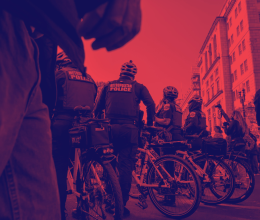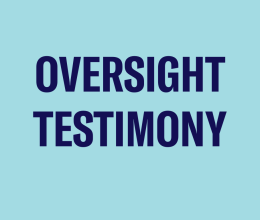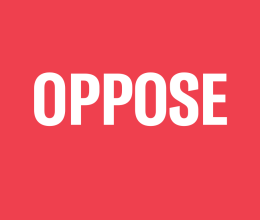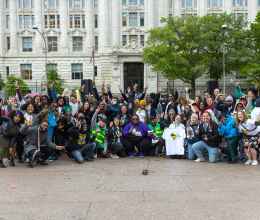October 30, 2020
Peter Newsham, Chief of Police
District of Columbia Metropolitan Police Department
300 Indiana Avenue NW
Washington, DC 20001
Sent via email: [email protected]
Re: Preparing for possible protest activity in connection with the election and inauguration
Dear Chief Newsham:
We write to you on behalf of the ACLU of the District of Columbia (ACLU-DC) regarding your preparations for mass demonstrations here in Washington, D.C. following Election Day 2020 and in connection with Inauguration Day 2021. In light of recent events and the stakes of the election, this year’s election and inauguration seem to us particularly likely to be the subject of demonstration and protest here in the District.
As you know, our organization is a staunch defender of the First Amendment, including via lawsuits against your department regarding the handling of demonstrations. Although we are no stranger to the courts, our mission is not to file a slew of lawsuits; rather, it is to preserve, defend, and advance the civil rights and liberties of everyone in the District.
To promote that goal, we want to call attention to a few areas of particular concern for us with regard to the constitutional rights of demonstrators, in the hope that doing so will assist you in your preparations.
Drawing on the lessons from the Inauguration Day 2017 protests (still a subject of our ongoing litigation), the Lafayette Square attack of June 1, 2020 (also a subject of our ongoing litigation), and more generally MPD’s actions during the last few months of increased demonstration activity here in the District, we offer the following suggestions of principles that we hope MPD leadership and officers will keep in mind in the coming months:
- Probable cause to arrest must be individualized. Outside of the rare circumstance in which an entire group is acting as a unit, a person cannot lawfully be arrested based on the conduct or suspected conduct of someone else. Accordingly, mass arrest or “kettling” tactics are highly suspect, and we believe these tactics have led to hundreds of unconstitutional arrests during the past four years. This is one of the principal lessons of the Inauguration Day 2017 mass arrest and subsequent litigation—litigation that a federal court refused to dismiss based on this very point.
- When the police decide to disperse a protest (which is itself an extreme measure), protestors have the right under D.C. law to a dispersal order that they can actually hear and a reasonable time and route to disperse safely. The D.C. First Amendment Assemblies Act (“FAAA”) provides rights beyond those protected by the First Amendment itself, and this right is very specifically described. We believe the failure of MPD to give FAAA-required dispersal orders on Inauguration Day 2017 likely caused hundreds of unconstitutional arrests and the use of excessive force against protestors who would have left the area had they received an order to do so.
- Demonstrators have the constitutional right to humane conditions of confinement, including reasonable precautions against COVID-19. We have obtained two preliminary injunctions against D.C. agencies this year because of the failure to take appropriate precautions to protect detainees from the spread of COVID-19—specifically, at the D.C. Jail and St. Elizabeths Hospital. We have also heard reports that individuals arrested by MPD at various demonstrations this year were packed together tightly, sometimes without masks, hand sanitizer, or other appropriate precautions. In light of the lessons of the COVID-19 litigation and the failure to take appropriate precautions (we believe) during recent arrests at demonstrations, the District should train officers to process arrestees in a manner that minimizes their risk of COVID-19, including through the use of hand-sanitizer, masks, and social distancing. Relatedly, MPD officers themselves should wear masks to protect public safety—as our colleague Nassim Moshiree’s July 16 letter to you discussed in detail. Finally, where only low-level offenses are involved, officers should strongly consider simply giving a citation rather than making a custodial arrest, which poses risks to both police officers and demonstrators far out of proportion to any conceivable public safety benefit.
- If MPD confiscates protestors’ cell phones, it cannot search them without a warrant and must return them in a timely manner. We have heard reports this year of officers arresting protestors, confiscating their cell phones, and retaining them for months. We are, additionally, aware of MPD’s use of the Cellebrite mobile device forensic extraction tool, which enables law enforcement to download the entire contents of a phone, including texts, contacts, emails, photos, location data, and more. It is unlawful for police agencies to retain a cell phone indefinitely in the hope that, at some point, the agency will be able to secure a warrant to search it. And it is unconstitutional under the Fourth Amendment to search a cell phone without a warrant even if MPD possesses the technological capacity to do so. MPD must act expeditiously to determine whether it can obtain a search warrant and, if it cannot, it must return—unsearched—the cell phones it seizes.
This list is not exhaustive of the rights of demonstrators and detainees. We nonetheless hope that highlighting a few areas in which we have specific concerns regarding MPD’s prior conduct might provide a useful reference point as you prepare for possible mass demonstrations and consider how best to train your department to respect demonstrators’ rights under District law and the U.S. Constitution.
We would be glad to discuss any of these issues further. We remain hopeful that whatever the coming months bring, demonstrators will be able to exercise their First Amendment rights freely in the unique forum that is the nation’s capital.
Sincerely,
Monica Hopkins, Executive Director, ACLU-DC
Scott Michelman, Legal Director, ACLU-DC
cc: Muriel Bowser, Mayor of the District of Columbia;
Karl Racine, Attorney General for the District of Columbia;
Phil Mendelson, Chair, Council of the District of Columbia;
Charles Allen, Chair, Judiciary Committee, Council of the District of Columbia
The PDF of this letter can be found here.



